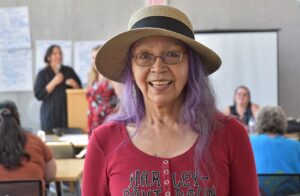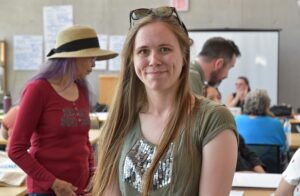First Nation Librarians strategize best service despite low funding

By Kelly Anne Smith
NORTH BAY — The 2023 Maanjidiwaad Annual Meeting of First Nation Public Libraries in Ontario (formerly called Spring Gathering) was held at the Nipissing University Harris Learning Library June 1 and 2. Normally an annual event, this was the first meeting since 2019 due to the COVID-19 pandemic.
Maanjidiwaad was the name chosen by the host community Nipissing First Nation to replace ‘Spring Gathering’. Maanjidiwaad means those who gather or gathering people. The Ontario Library Service organizes the Maanjidiwaad Annual Meeting.
In total, 17 on-reserve public librarians discussed best practices, problem-solving, and their challenges including funding.
Advocating for better funding for First Nation libraries is the Ontario Library Association. The website states that of the 133 First Nations in Ontario, only 39 have public libraries. Pre-pandemic, there were 46 First Nation libraries. The First Nation salary supplement from the province is around $13,000 annually.
Nipissing First Nation Kendaaswin Librarian Randy Penasse says COVID-19 halted the useful discussions with other librarians at past Spring Gatherings.
“I find these really brighten up my outlook toward the future for my library because I get to converse with people and find out the problems that they might have had similar to mine or issues they had to overcome because of COVID-19.”
Penasse says exchanging ideas helps him devise the best plan to recruit new users of the library.
“Because of the three-year gap of services when we were closed, a lot of the children that were there before are older now so they are not coming as much. They were 10 and now they’re 13. Coming to the library for story time and even to have a movie with pizza doesn’t entice them anymore,” says Penasse. “It’s the five-year-olds back then that are eight now who want to go to movie nights and want to eat pizza and want to do story times. The need is still there.”
The pandemic had people keeping books for three years when they are only supposed to have them for three weeks.
“We are a small-knit community so a lot of the kids know me and they know my children. They will see me and say, ‘Oh, the book!'”

Tessa Hope of the Temagami First Nation Public Library says there is a problem with getting adults to take part in the services.
“Our youth go from ages 14 to 30, but after youth, there’s an age range between 30 and 50 where you don’t have much programming — I am making programming to reach those people. That means small business programming and things to do with learning technology.”
Hope explains that a lot of people have issues accessing resources due to lack of technology skills.
“We need to bring up the technology skills; that’s what my barrier is. We are holding these digital programs but then people can’t access them.”
Hope says learning skills to navigate digital online resources with computers and phones is useful for community members.
“We opened a drop-in session for technology skills so if people are struggling to access this stuff, they can come in and learn how to Zoom, for example, or access an e-mail or figure out what an e-mail is. We do have some adults that aren’t even on e-mail yet. So, just explaining those basics and showing them what it is, that’s what we are focusing on right now for the Temagami First Nation Library,” Hope explains. “With increased digital skills in our community, we have an increased participation. People are able to access more. They actually can find the resources online and bring more in-depth questions.”
“For example, at one of our recent sessions on citizenship, I had photo books available,” Hope adds. “Usually, I will let people come and see those photo books or the family trees, and they can access those online sometimes for our members, but teaching them how to access it from home is a real key thing. We have a ton of resources. It’s getting that accessibility there for the people. That’s what our technology drop-in program is for, to help increase access.”
The Bkejwanong First Nation Public Library has Linda Lou Classens at the helm, bringing her background in teaching to Walpole Island.
“I have many schools that come in or I go out. I’m all about trying to make sure our kids are seeing literacy as a tool and as a source of imagination and joy. They want to learn about Indigenous stories, and I’m a good storyteller. I’m all about education and linking our stories and the land to a child’s sense of wonder.”
Classens says the Bkejwanong First Nation Public Library has seniors programming and coffee houses.
“We do history and genealogy. We do family movie nights. And we do different crafts and rentals.”
Posters were handed out by Nancy Cooper, the First Nation Communities Read coordinator and First Nations Consultant at Southern Ontario Library Service and from Chippewas of Rama First Nation.
“This year is our twentieth anniversary for First Nation Communities Read. The really amazing thing about this award is that it was developed by First Nation librarians on reserves. They are looking at the award-winning books through a librarian lens.”
First Nation Communities Read has grown exponentially says Cooper.
“It’s exploded. Some publishers are putting out seven, eight, nine, ten titles a year that Indigenous people are creating. It’s amazing! I know every major publisher in Canada is getting on board and supporting Indigenous writers,” Cooper says. “One of the really cool things about this program is we get posters and we have provincial and territorial partners. You’ll notice on the bottom of the poster, there’s different logos from provinces and territories. They purchase posters in bulk and then they disseminate the posters all over their areas; so libraries all over Canada, schools all over Canada, will be seeing the titles and will be thinking, ‘Maybe I should go and get that book’. We work closely with goodminds.com; a portion of every sale goes to supporting Indigenous libraries.”


